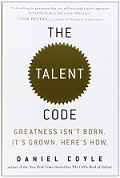Book Review - The Talent Code
 The Talent Code
The Talent Code
Daniel Coyle
ISBN-13: 978-0553806847
Overview
What is the secret of talent? How do we become great at something?
Coyle suggests that myelin is behind it all. Myelin is an insulating material that forms a sheath around nerve fibers in the brain. The stronger the myelin sheath, the better the signal strength, speed, and accuracy of the nerve impulse. This in turn makes physical and mental actions quicker, clearer, and more accurate. This is what we commonly refer to as a talent or skill.
Now we have a new question to ask: how can we promote myelination? Coyle suggests that there are three components: deep practice, ignition, and master coaching. The book is full of case studies to illustrate how this works, so I’ll give a short description of each part.
First, it is important to note that practice is not deep practice. Simply going through the motions of practice won’t cut it - deep practice must be deliberate. This deep practice, as Coyle defines it, requires several things:
- A deep practice session must be focused on learning.
- We must purposefully operate at the edge of your ability. If we aren’t making mistakes, we won’t learn anything new.
- We must be able to accurately identify mistakes. If there is not a clear distinction between success and failure, we can’t tell if new approaches and techniques are working or not.
If we are going to invest enough time and energy to grow our talent, we need to be highly motivated. Building that motiviation is what Coyle refers to as ignition. I call it engagement. I think some might call it passion. Whatever the name, we must be interested and invested in learning.
Master coaching is the concept of a third party that assists in the learning process. The coach does not need to already be an expert in the skill that is being learned, though it helps. Rather, the coach is there to facilitate deep practice sessions and sustain ignition (such as with encouragement and motivation).
Takeaways
Ignition and deep practice can be mostly driven by the individual. Finding a master coach seems more difficult.
The best coaches/mentors don’t need to be Great Leaders, they need to listen and observe. It is not inspiring speeches that build talent, it is small, targeted, highly specific suggestions. It is not pep talks, but rather customizing a message to the personality of the student.
Break everything down into its component pieces. Actions, thoughts, movements, bars of music. Small components make it easy to focus on repetition and quick iterations, which are key. We need fast feedback on failure. That sounds familiar - where have I heard that before?
Myelination is one-way (wraps, it does not unwrap), barring disease, injury, or age. This explains hard-to-break habits - it is easier for impulses to fire for well-established bad habits than new good habits. We must keep going until the pathway for the good habit is stronger.
When praising others, do not praise smarts. This leads to an emphasis on appearing smart, which encourages low risk-taking behaviors. If the person is not taking risks, they are not operating at the edge of their skill, which slows progress and learning.
Questions
How can we sustain ignition?
How can we become master coaches?
Can we get into “deep practice” mode at work? That is, can work be treated as practice?
How do we train “slow” or “low feedback” skills? A few examples that came to mind would be architecture and estimation.